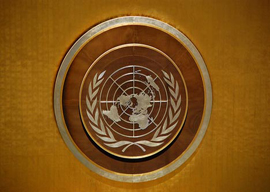
April 26, 2011

It would be hard to argue with the work of the organization’s specialized agencies. The World Health Organization (despite Margaret Sanger’s influence) and the Food and Agriculture Organization (evocatively housed in Mussolini’s Ministry of the Colonies building in Rome) are responsible for the survival of thousands, perhaps millions, who would otherwise be dead. Much the same could be said of the UN’s refugee agencies. The UN’s peacekeeping record is spotty, but when they have been successful, the blue helmets have indeed saved lives (though the UN’s peacekeeping website makes no mention of one of its most venerable commands).
Just as I furiously reject all of the New Deal as a usurpation”except the Federal Writers” Project (which employed writers like me and produced a still-essential series of state guidebooks), my hypocrisy is also manifest with regard to UNESCO’s heritage programs. They are designed to defend “intangible” heritage”ceremonies and rituals that have made a major contribution to world civilization. One of these is “The gastronomic meal of the French“. I strongly approve.
Personal porc-barreling aside, the fact remains that the UN behaves more and more like a de facto world government. The process will be familiar to anyone who has studied the history of the United States and the European Union. From voluntary associations of independent entities, both groupings became ever more super-states as a common bureaucracy developed and time’s passage appeared to legitimize them. As sufficient elites and power groupings became more committed to these supra-governments, the opposition was marginalized. In the face of centralized government’s “benefits” (and the downplaying of its debits), talk of “local liberties” and “old constitutions” was reduced to sheer romanticism, whether or not a bloody civil war was involved. But what is an accomplished fact in the United States is still an ongoing process in Europe.
For so many of the planet’s wealthier population, globalization is a current reality. How many of us, especially the young, are in constant contact with likeminded peers across the globe in a manner unthinkable two decades ago? While the majority of the planet remains too poor to have Internet access, ever-growing numbers have an ever-increasing ability to affect world events.
A number of changes”or “reforms””are being planned to strengthen the United Nations. Among these are the International Court of Justice, a standing peacekeeping force, and perhaps most far-reaching of all, selection of the General Assembly either by member nations” parliaments or direct popular election.
One can imagine any number of occurrences, none extremely pleasant, that could derail this process: economic collapse, Islamic jihad, worldwide plague, and so on. But a functioning world government”given the track record of the type of folk who would probably dominate it, as opposed to the idealists who dream of it”does not seem much better. After all, these sort of people run us now on a national basis.